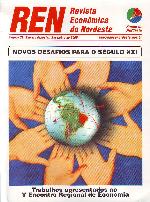COMPETIÇÃO FISCAL NO BRASIL, UMA ANÁLISE EMPÍRICA AGREGADA
DOI:
https://doi.org/10.61673/ren.2000.1915Keywords:
Fiscal Competition-Brazil, Tribute ChargeAbstract
This article presents an empirical analysis of fiscal competition in Brazilian states in the period from 1985 to 1997. It shows an statistical methodology applied to the Brazilian case which makes it possible to conduct an empirical investigation of its existence and of the ways the fiscal competition occurs among the states. The results suggest that the fiscal competition is dominated by movements of taxes cuts in states with tribute charge below the national average. Such movements are reverted in a later moment, suggesting strategic actions of the states in order to avoid unlimited fiscal competition.
Downloads
Download data is not yet available.
Downloads
Published
2000-06-30
How to Cite
Holanda, M. C. (2000). COMPETIÇÃO FISCAL NO BRASIL, UMA ANÁLISE EMPÍRICA AGREGADA. Revista Econômica Do Nordeste, 31(Suplemento Especial), 594–603. https://doi.org/10.61673/ren.2000.1915
Issue
Section
Artigos








